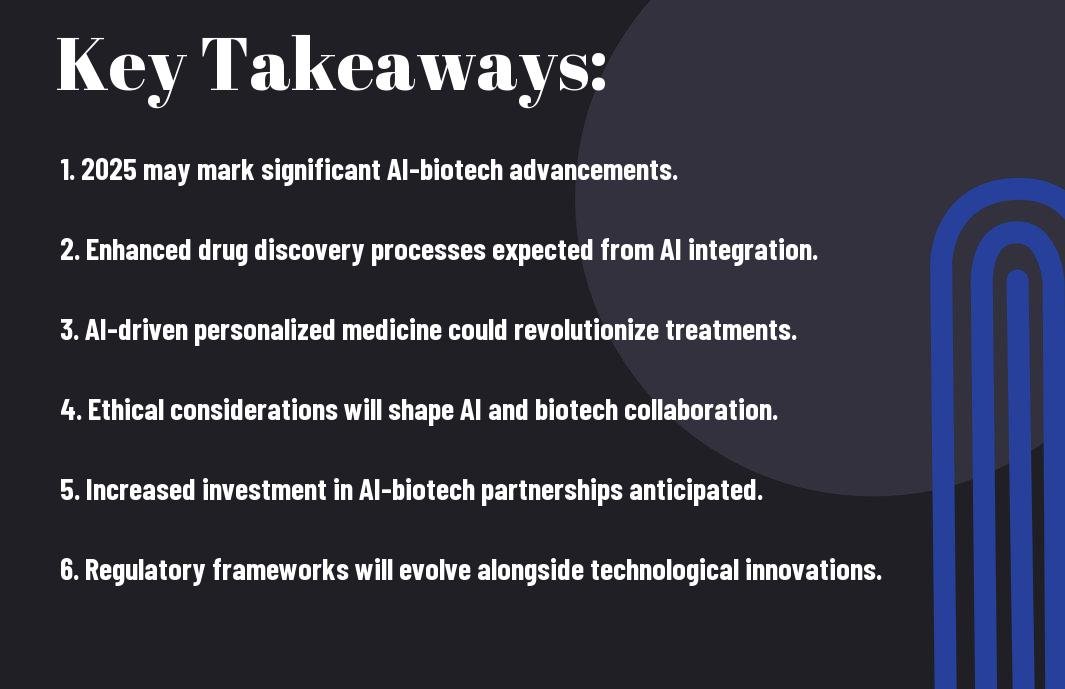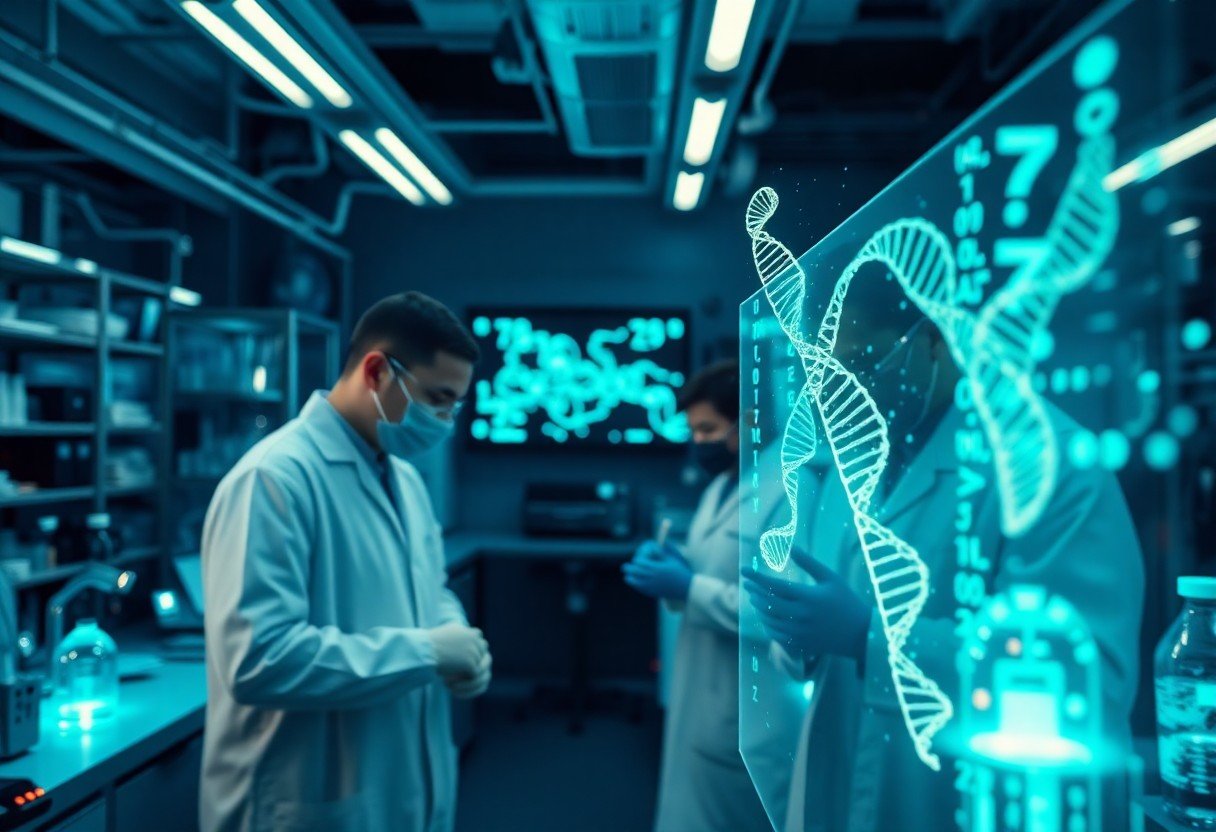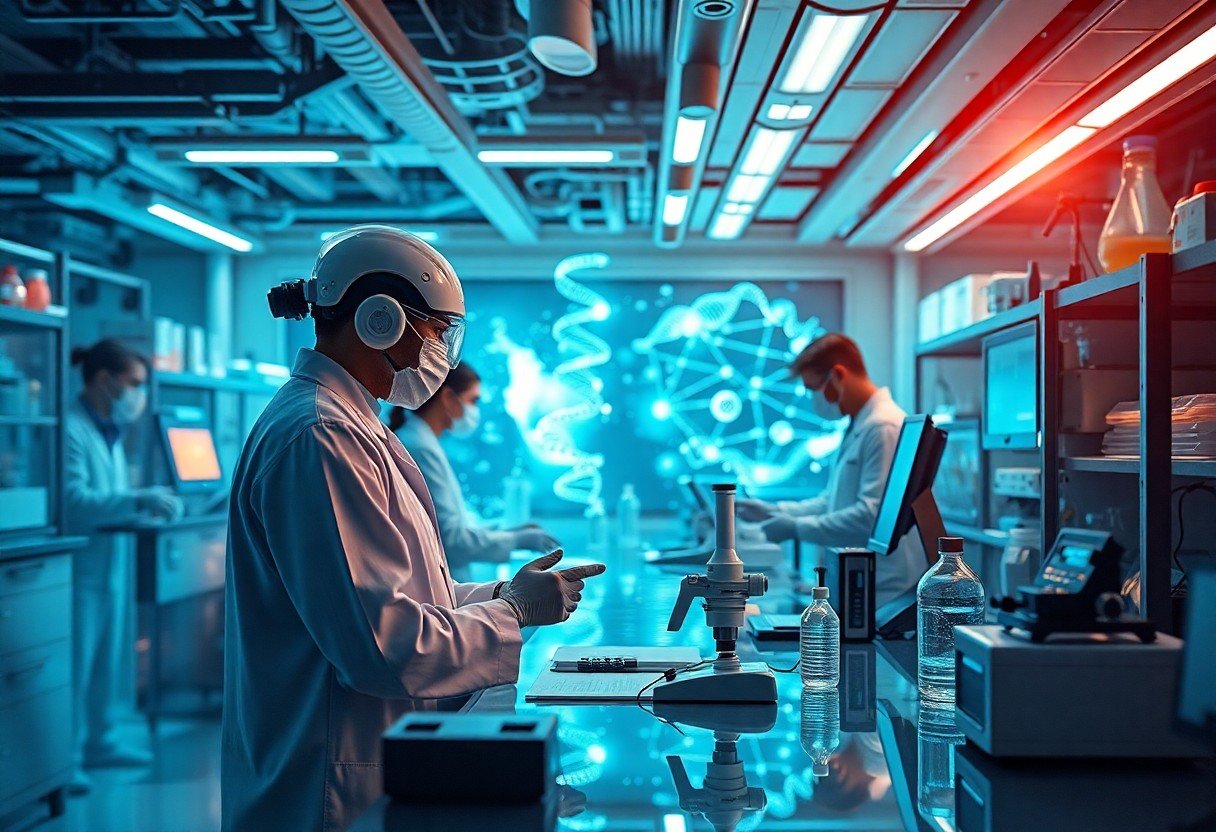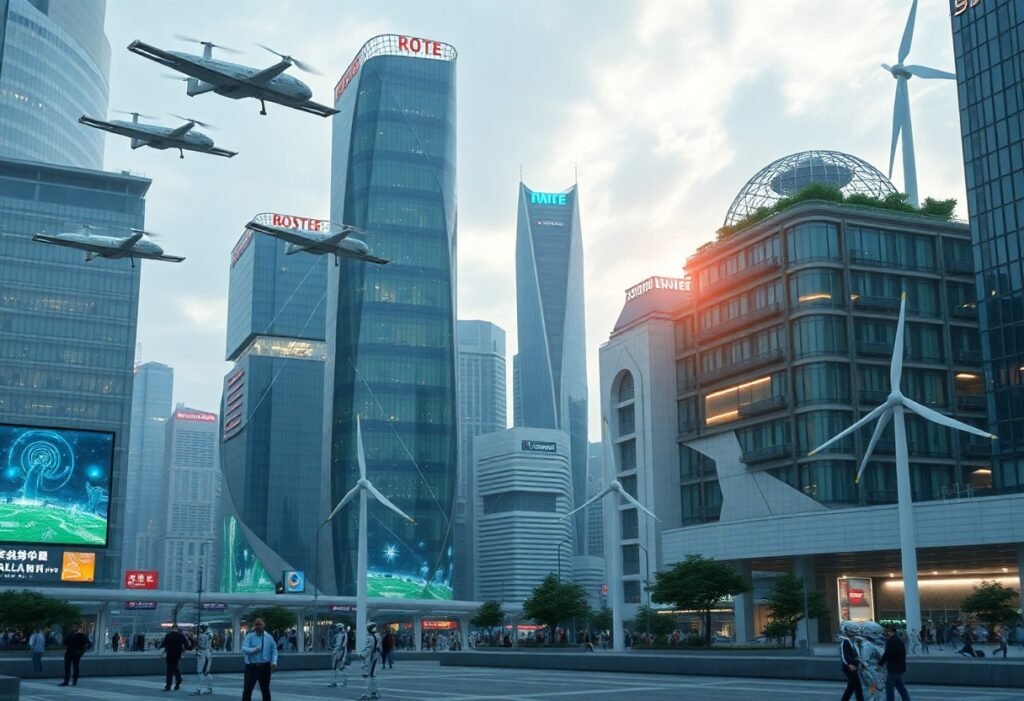With advancements in artificial intelligence and biotechnology accelerating at an unprecedented pace, you may be wondering what the year 2025 holds for these powerful fields. As researchers increasingly integrate AI algorithms into biotech applications, the potential for groundbreaking innovations could reshape healthcare, agriculture, and many other sectors. This convergence promises to enhance everything from drug development to personalized medicine, making it crucial for you to stay informed about these transformative changes and their implications for the future.

Defining AI and Biotech
At the intersection of technology and biology lie artificial intelligence (AI) and biotechnology, two fields that are rapidly evolving to shape the future of health and innovation. AI refers to the simulation of human intelligence in machines, enabling them to learn, reason, and solve problems autonomously. Biotech, on the other hand, encompasses the use of living organisms and biological systems to develop products and technologies aimed at improving health and sustainability. As you explore these domains, you’ll uncover their potential to revolutionize industries and enhance your understanding of life sciences.
Overview of Artificial Intelligence
To grasp the significance of AI, consider that it spans various technologies, including machine learning, natural language processing, and robotics. These systems can analyze vast datasets and automate complex tasks, allowing you to make data-driven decisions faster and more efficiently.
Overview of Biotechnology
Along with AI, biotechnology focuses on manipulating biological systems for useful purposes, such as healthcare and agriculture. This interdisciplinary field leverages cellular and biomolecular processes, enabling innovations like gene editing and synthetic biology that can have profound impacts on your health and the environment.
Due to the advancements in genetic engineering and molecular biology, biotechnology has opened up new avenues for treating diseases, developing sustainable agricultural practices, and producing biofuels. Techniques like CRISPR have revolutionized how you can edit genes, paving the way for personalized medicine and targeted therapies. As a result, biotech not only enhances your wellbeing but also addresses global challenges such as food security and climate change, making it an area of immense relevance in today’s world.
Historical Context
Some may not realize that the intersection of artificial intelligence and biotechnology has deep historical roots. The collaboration began in earnest during the late 20th century, as researchers recognized the potential of computational tools to enhance biological research. This pioneering spirit paved the way for breakthroughs that would later redefine both fields and ultimately lead to the exciting developments you are witnessing today.
Evolution of AI in Biotech
By the early 2000s, advancements in machine learning and data analytics started to surface, enabling scientists to process vast amounts of biological data effectively. These technologies have continuously evolved, allowing you to harness AI for genomics, drug discovery, and personalized medicine, thus transforming the landscape of biotechnology.
Key Milestones and Innovations
Innovations have marked significant turning points in the convergence of AI and biotech, fundamentally altering research methodologies. As machine learning algorithms improve, they operate with increased efficiency and accuracy, leading to remarkable progress in areas like disease diagnosis and treatment optimization.
To truly appreciate the rapid growth in this field, consider the remarkable milestones you’ve encountered in recent years. From the introduction of AI-driven platforms for genome sequencing to the deployment of AI in drug trial predictions, each innovation has contributed to a robust toolkit, empowering researchers to achieve results that were once unimaginable. In 2020, for instance, the development of AI models in protein folding showcased potential breakthroughs, setting a promising foundation for future advancements you will see as we move toward 2025.

Current Trends
All signs indicate that artificial intelligence (AI) and biotechnology are converging at an unprecedented pace. As the landscape of healthcare and pharmaceuticals evolves, you will notice increased collaborations between tech companies and biotech firms. This dynamic relationship is leading to more efficient research processes, new treatment modalities, and ultimately, improved patient outcomes. Your understanding of these trends will empower you to stay ahead in this rapidly advancing field.
AI Applications in Drug Discovery
Trends show that AI is revolutionizing drug discovery by accelerating target identification and compound screening. You may find that machine learning algorithms can analyze vast datasets to uncover hidden patterns in biological data, making drug discovery faster and more cost-effective. The ability to predict molecular interactions has the potential to reduce the time it takes to bring new drugs to market, offering hope for treatments that were previously deemed too complex or impractical.
Biotech Innovations Enabled by AI
Enabled by AI, biotech innovations are transforming agriculture, personalized medicine, and even gene editing. You might observe that genetic engineering techniques like CRISPR are being greatly enhanced through predictive analytics, which optimizes editing strategies. This intersection of AI and biotechnology is not merely theoretical; it is yielding practical results that can reshape entire industries.
Due to the integration of AI into biotech, you can expect to see groundbreaking advancements that not only streamline existing practices but also pioneer new methodologies. For instance, AI algorithms can now help scientists design custom therapies tailored to an individual’s genetic makeup, a game-changer for personalized medicine. Similarly, innovations in agricultural biotech are utilizing AI to enhance crop yields and resist pests more effectively. As these technologies mature, they will redefine your expectations of what is possible in biotechnology, bridging the gap between complex biological problems and innovative solutions.
Challenges and Limitations
Keep in mind that while the convergence of AI and biotechnology could revolutionize healthcare and many sectors, significant challenges persist. You may encounter issues related to data privacy, ethical considerations, and regulatory hurdles, which can impede progress. For more insights, consider visiting AI Predictions 2025 – Mass Tech Leadership Council.
Data Privacy and Ethical Concerns
Beside the technological advancements, there are pressing issues around data privacy and ethical concerns. You must be aware of how sensitive personal health data is collected, stored, and used, which raises questions about consent and ownership. Striking a balance between innovation and safeguarding individual rights is vital for public trust.
Technical and Regulatory Barriers
Challenges exist in navigating the technical and regulatory frameworks that govern both AI and biotech industries. You will need to understand the existing guidelines and adapt to constantly evolving regulations that can vary significantly between regions. The integration of AI into biotechnology isn’t merely about technological feasibility; it requires compliance with stringent health regulations and safety standards.
The landscape of technical and regulatory barriers can be complex and multifaceted. You might find that different countries have variances in their governmental oversight, affecting how AI and biotechnological innovations are developed and implemented. Fostering collaboration between AI developers, biotechnologists, and regulatory bodies is vital to streamline processes and ensure that products not only meet health standards but also gain market acceptance. It’s pivotal for you to stay informed about these dynamics as they will significantly influence the pace and nature of advancements in this confluence.
Future Projections
After examining the current trends in AI and biotechnology, it becomes clear that 2025 could be a landmark year. The integration of these two fields is already reshaping healthcare, and by 2025, you may see advancements that streamline drug development, enhance diagnostics, and personalize treatments like never before. The synergy between AI algorithms and biotech innovations will likely create unprecedented opportunities for both researchers and patients alike.
Predicting the 2025 Landscape
By analyzing existing technology and its trajectory, you can anticipate a landscape in 2025 where AI-driven systems will assist in groundbreaking research, enabling rapid data analysis and discovery. This could result in a significant reduction in time and costs associated with bringing novel therapeutics to market. As these tools become more accessible, your opportunities to engage with cutting-edge solutions in medical research will expand.
Potential Breakthroughs and Opportunities
For the innovative minds in biotech, 2025 presents a multitude of possibilities. The convergence of AI with genomic research, for instance, may lead to the creation of tailored treatments based on your genetic profile. Moreover, AI-powered predictive modeling could revolutionize clinical trials, increasing the likelihood of successful outcomes.
In addition, the convergence of AI and biotech could give rise to breakthroughs in personalized medicine, where treatments are tailored specifically to your genetic makeup. This shift may allow for more accurate predictions of drug efficacy and reduced adverse effects. Furthermore, AI-enhanced platforms could facilitate real-time patient monitoring, informing better decision-making and care strategies. As you navigate this exciting era, staying informed about these advancements not only enriches your understanding but also opens doors to innovations that may directly impact your health and wellness.

Implications for Society
For you, the convergence of AI and biotechnology in 2025 holds significant implications for society at large. It could reshape healthcare, privacy, and ethical standards. As innovations unfold, being informed about the potential impacts is vital. Check out this article on 2025 predictions – how AI is likely to play out in the new year to gain deeper insights.
Healthcare Transformation
An era of personalized medicine may emerge, allowing you to receive treatments tailored specifically to your genetic makeup. AI’s integration with biotech could streamline drug discovery and development, enhancing efficiency and accelerating breakthroughs in healthcare.
Economic and Employment Considerations
At the same time, the integration of AI and biotechnology could lead to both challenges and opportunities in the job market. Some traditional roles may diminish, while new careers may arise that focus on managing and integrating these technologies.
To navigate these changes, you should consider upskilling or reskilling in areas where AI and biotech intersect. Embracing adaptability will be key as industries evolve, allowing you to remain relevant in a competitive workforce. The demand for professionals skilled in these technologies is likely to surge, presenting new career paths for you to explore.
Conclusion
So, as you explore the intersection of AI and biotech, consider how 2025 may serve as a pivotal point in this evolving landscape. With advancements in machine learning and genetic engineering, you are likely to witness transformative developments that could redefine healthcare, agriculture, and beyond. Staying informed and engaged will empower you to navigate these changes and harness the potential benefits that this convergence offers. Embrace the possibilities and be part of this exciting journey into the future.









